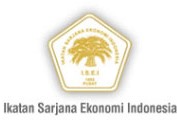Economic Liberalization Impact, Fiscal Conditions, and Tax Ratio to Welfare
(1) Faculty of Economics and Business, Sebelas Maret University, Solo, Indonesia
(2) Faculty of Economics and Business, Sebelas Maret University, Solo, Indonesia
(3) Faculty of Economics and Business, Sebelas Maret University, Solo, Indonesia
(4) Faculty of Economics and Business, Sebelas Maret University, Solo, Indonesia
Abstract
Keywords
Full Text:
PDFReferences
Acharya, Sanjaya., Cohen, Solomon., 2008. Trade liberalisation and household welfare in Nepal. Journal of Policy Modeling. 30, 1057–1060
Andreano, M. Simona., Laureti, Lucio., Postiglione, Paolo., 2013. Economic growth in MENA countries: Is there convergence of per-capita GDPs?. Journal of Policy Modeling 35, 669–683.
Angresano, James., 2004. European Union integration lessons for ASEAN+3: the importance of contextual specificity. Journal of Asian Economics 14, 909–926
Ariyasajjakorn, Danupon., Gander, James P., Ratanakomut, Somchai., Reynolds, Stephen E., 2009. ASEAN FTA, distribution of income, and globalization. Journal of Asian Economics 20, 327–335
Beraldo, Sergio., Montolio, Daniel., Turati Gilberto., 2009. Healthy, educated and wealthy: A primer on the impact of public and private welfare expenditures on economic growth, Journal of Socio-Economics 38, 946-956
Binner, Jane., Chen, Shu-Heng., Lai, Ke-Hung., Mullineux, Andrew., Swofford, James L., 2011. Do the ASEAN countries and Taiwan form a common currency area?. Journal of International Money and Finance 30, 1429–1435
Boubaker, Sabri., Jouini, Jamel., 2014. Linkages between emerging and developed equity markets: Empirical evidence in the PMG framework. North American Journal of Economics and Finance. No 29 pp 322–335
Chia Liang, Chin., Bau Lin, Jeng., Cheng Hsu, Hao., 2013. Reexamining the relationships between stock prices and exchange rates in ASEAN-5 using panel Granger causality approach. Economic Modelling 32, 560–563
Clist, Paul & Oliver Morrissey. (2008). ‘ Aid and Tax Revenue: Sign of a Positive Effect Since the 1980s ‘, UK, Notingham University.
Damania, Richard., Fredriksson, Per G., 2007. Trade policy: What′s welfare got to do with it? Economics Letters. 96, 64–69
Dima, Bogdan., Maria Dima, Ştefana., Barna, Flavia., 2014. The signaling effect of tax rates under fiscal competition: A (Shannonian) transfer entropy approach. Economic Modelling. Vol. 42, pp. 373–381
Egger, Peter., Larch, Mario., Pfaffermayr, Michael., 2004. Multilateral trade and investment liberalization: effects on welfare and GDP per capita convergence. Economics Letters. 84, 133–140
Egger, Hartmut., Etzel, Daniel., 2012. The impact of trade on employment, welfare, and income distribution in unionized general oligopolistic equilibrium. European Economic Review. 56, 1119–1135
Guisán, MarÃa Carmen., FrÃas, Isidro., 1997. Economic Growth and Social Welfare in the European Regions. Working Paper No 9, Euro-American Association of Economic Development
Hakim, Taufik Abdul & Imbarine Bujang. (2011). ‘The Impact and Consequences of Tax Revenues’ Components on Economic Indicators: Evidence from Panel Group Data’. International Research Journal of Finance and Economics
Herz, Bernhard., Roger, Werner., 1995. Economic Growth and Convergence in Germany. Weltwirtschaftliches Archiv. 131, 132-143
Jayanthakumaran, Kankesu., Sangkaew, Piyapong., O’Brien, Martin., 2013. Trade liberalization and manufacturing wage premiums: Evidence from Thailand. Journal of Asian Economics, 29, 15-23.
Jiranyakul, Komain., Opiela, Timothy P., 2010. Inflation and inflation uncertainty in the ASEAN-5 economies. Journal of Asian Economics 21, 105–112
Mohan, Ramesh., Nandwa, Boaz., 2009. Examining Interest Rate Linkages Among Asean-5, China and India. International Journal of Applied Econometrics and Quantitative Studies V6-2
Molana, Hassan., Montagna, Catia., 2007. Expansionary effects of the welfare state in a small open economy. North American Journal of Economics and Finance, 18, 231–246
Narayanan, G. Badri., Khorana, Sangeetha., 2014.Tariff escalation, export shares and economy-wide welfare: A computable general equilibrium approach. Economic Modelling 41, 109–118
Neto, Delfim Gomes, Veiga, Francisco José., 2013. Financial globalization, convergence and growth: The role of foreign direct investment. Journal of International Money and Finance. 37, 161–186
Peretto, Pietro F., (2006). Corporate taxes, growth and welfare in a Schumpeterian economy. Journal of Economic Theory. xxx, xxx-xxx.
Rana, Pradumna Bickram., Mun Chia, Wai., Jinjarak, Yothin., 2012. Monetary integration in ASEAN+3: A perception survey of opinion leaders. Journal of Asian Economics 23, 1–12
Scully, GW. (1991). ‘Tax Rate, Tax Revenue and Economic Growth’. Dalas, Texas, National Center for Policy Analysis
Simorangkir, Iskandar. (2006). ‘The Openness and Its Impact to Indonesian Economy: A SVAR Approach’. Jakarta. Jurnal Ekonomi Moneter, Bank Indonesia.
Tang, Hsiao Chink., Liu, Philip., Cheung, Eddie C., 2013. Changing impact of fiscal policy on selected ASEAN countries. Journal of Asian Economics 24, 103–116.
Refbacks
- There are currently no refbacks.

This work is licensed under a Creative Commons Attribution 4.0 International License.






